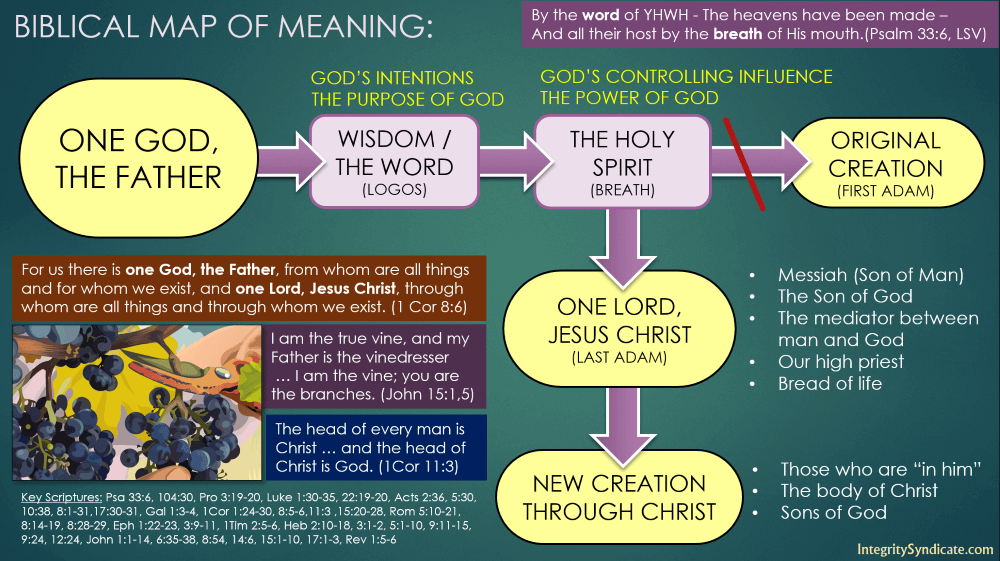1 John 1:1-3
The prologue to 1 John provides some interesting clues to clarify the Prologue of John. We see from 1 John 1:2, eternal life was with the Father and has now been manifest. Eternal life is not a person but rather a concept. For eternal life having been with (pros) the Father is indicating that it was in view (toward/facing) the Father from the beginning. It is in a similar sense that the Logos (Word) was with (facing toward) God. Here we examine the Greek and provide a literal and interpretative translation.
1 John 1:1-3 (NA28)
1 Ὃ ἦν ἀπʼ ἀρχῆς, ὃ ἀκηκόαμεν, ὃ ἑωράκαμεν τοῖς ὀφθαλμοῖς ἡμῶν, ὃ ἐθεασάμεθα καὶ αἱ χεῖρες ἡμῶν ἐψηλάφησαν περὶ τοῦ λόγου τῆς ζωῆς —
2 καὶ ἡ ζωὴ ἐφανερώθη, καὶ ἑωράκαμεν καὶ μαρτυροῦμεν καὶ ἀπαγγέλλομεν ὑμῖν τὴν ζωὴν τὴν αἰώνιον ἥτις ἦν πρὸς τὸν πατέρα καὶ ἐφανερώθη ἡμῖν —
3 ὃ ἑωράκαμεν καὶ ἀκηκόαμεν, ἀπαγγέλλομεν oκαὶ ὑμῖν, ἵνα καὶ ὑμεῖς κοινωνίαν ἔχητε μεθʼ ἡμῶν. καὶ ἡ κοινωνία δὲ ἡ ἡμετέρα μετὰ τοῦ πατρὸς καὶ μετὰ τοῦ υἱοῦ αὐτοῦ Ἰησοῦ Χριστοῦ.
Interlinear Table, 1 John 1:1-3
Below is a word for word interlinear table with the Greek, English translation, Parsings and lexicon definition of each word (Concise Greek-English Dictionary of the New Testament, Barclay Newman, supplemented by BDAG)
Greek | Translation | Parsing | Glossary |
1 Ὃ | 1 What | Pronoun, Nominative, Neuter, Singular | who, which, what, that; anyone, someone, a certain one |
ἦν | was | Verb, Imperfect, Active, Indicative, 3rd Person, Singular | be, exist; happen, take place; live; be located in; remain, stay; come |
ἀπʼ | from | Preposition Governing the Genitive | from, away from; by means of; out of; against |
ἀρχῆς | of first | Noun, Genitive, Feminine, Singular | beginning, first |
ὃ | what | Pronoun, Accusative, Neuter, Singular | who, which, what, that; anyone, someone, a certain one |
ἀκηκόαμεν | we heard | Verb, Perfect, Active, Indicative, 1st Person, Plural | hear; receive news of; give heed to; understand |
ὃ | what | Pronoun, Accusative, Neuter, Singular | who, which, what, that; anyone, someone, a certain one |
ἑωράκαμεν | we have seen | Verb, Perfect, Active, Indicative, 1st Person, Plural | see, observe, notice (pass. appear); perceive, understand, recognize; experience; visit, come to see |
τοῖς | that | Verb, Imperfect, Active, Indicative, 3rd Person, Singular | the; this, that; he, she, it |
ὀφθαλμοῖς | in eyes (view) | Noun, Dative, Masculine, Plural | eye(s) |
ἡμῶν | of us | Pronoun, Genitive, (No Gender), Plural, 1st Person | we, us, our |
ὃ | what | Pronoun, Accusative, Neuter, Singular | who, which, what, that; anyone, someone, a certain one |
ἐθεασάμεθα | we observed | Verb, Aorist, Middle, Indicative, 1st Person, Plural | see, look at; notice, observe; visit |
καί | and | Conjunction | and; and then, then; but, yet, however; also, even, likewise |
αἱ | those | Determiner, Nominative, Feminine, Plural | the; this, that; he, she, it |
χεῖρες | hands (authorities) | Noun, Nominative, Feminine, Plural | Hand, power, authority; activity; finger |
ἡμῶν | of us | Pronoun, Genitive, (No Gender), Plural, 1st Person | we, us, our |
ἐψηλάφησαν | we touched | Verb, Aorist, Active, Indicative, 3rd Person, Plural | touch, feel |
περὶ | regarding | Preposition Governing the Genitive | about, concerning, of, with reference to; for; on account of |
τοῦ | the | Determiner, Genitive, Masculine, Singular | the; this, that; he, she, it |
λόγου | of logos | Noun, Genitive, Masculine, Singular | something said (e.g. word; saying; message, teaching; talk, conversation; reasoning |
τῆς | the | Determiner, Genitive, Feminine, Singular | the; this, that; he, she, it |
ζωῆς | of life | Noun, Genitive, Feminine, Singular | life (literally or figuratively) |
καί | and | Conjunction | and; and then, then; but, yet, however; also, even, likewise |
ἡ | the | Determiner, Nominative, Feminine, Singular | the; this, that; he, she, it |
ζωὴ | life | Determiner, Accusative, Masculine, Singular | life |
ἐφανερώθη | was manifested | Verb, Aorist, Passive, Indicative, 3rd Person, Singular | to render apparent (literally or figuratively): — appear, manifestly declare, (make) manifest (forth), shew (self) |
καί | and | Conjunction | and; and then, then; but, yet, however; also, even, likewise |
ἑωράκαμεν | we have seen | Verb, Perfect, Active, Indicative, 1st Person, Plural | see, observe, notice (pass. appear); perceive, understand, recognize; experience; visit, come to see |
καί | and | Conjunction | and; and then, then; but, yet, however; also, even, likewise |
μαρτυροῦμεν | we had testified | Verb, Present, Active, Indicative, 1st Person, Plural | to be a witness, i.e. testify (literally or figuratively): — charge, give (evidence), bear record, have (obtain, of) good (honest) report, be well reported of, testify, give (have) testimony, (be, bear, give, obtain) witness |
καί | and | Conjunction | and; and then, then; but, yet, however; also, even, likewise |
ἀπαγγέλλομεν | we declare | Verb, Present, Active, Indicative, 1st Person, Plural | to announce: — bring word (again), declare, report, shew (again), tell |
ὑμῖν | to you | Pronoun, Dative, (No Gender), Plural, 2nd Person | to (with or by) you: — ye, you, your(-selves) |
τὴν | the | Determiner, Accusative, Feminine, Singular | the; this, that; he, she, it |
ζωὴν | life | Noun, Accusative, Feminine, Singular | life |
τὴν | the | Determiner, Accusative, Feminine, Singular | the; this, that; he, she, it |
αἰώνιον | eternal (extensive) | Adjective, Accusative, Feminine, Singular | perpetual (also used of past time, or past and future as well): — eternal, for ever, everlasting, world (began) |
ἥτις | which | Pronoun, Nominative, Feminine, Singular | which some, i.e. any that; also (definite) which same: — x and (they), (such) as, (they) that, in that they, what(-soever), whereas ye, (they) which, who(-soever) |
ἦν | was | Verb, Imperfect, Active, Indicative, 3rd Person, Singular | be, exist; happen, take place; live; be located in; remain, stay; come |
πρὸς | toward | Preposition Governing the Accusative | (gen.) to, for; (dat.) on, at, near, by; (acc.) to, toward; with; in order to; against |
τὸν | the | Determiner, Accusative, Masculine, Singular | the; this, that; he, she, it |
πατέρα | was | Noun, Accusative, Masculine, Singular | a “father” (literally or figuratively, near or more remote) |
καί | and | Conjunction | and; and then, then; but, yet, however; also, even, likewise |
ἐφανερώθη | was manifested | Verb, Aorist, Passive, Indicative, 3rd Person, Singular | to render apparent (literally or figuratively): — appear, manifestly declare, (make) manifest (forth), shew (self) |
ὑμῖν | to us | Pronoun, Dative, (No Gender), Plural, 1st Person | to (with or by) you: — ye, you, your(-selves) |
3 ὃ | 3 what | Pronoun, Accusative, Neuter, Singular | who, which, what, that; anyone, someone, a certain one |
ἑωράκαμεν | we have seen | Verb, Perfect, Active, Indicative, 1st Person, Plural | see, observe, notice (pass. appear); perceive, understand, recognize; experience; visit, come to see |
καί | and | Conjunction | and; and then, then; but, yet, however; also, even, likewise |
ἀπαγγέλλομεν | we declare | Verb, Present, Active, Indicative, 1st Person, Plural | to announce: — bring word (again), declare, report, shew (again), tell |
καί | and | Conjunction | and; and then, then; but, yet, however; also, even, likewise |
ὑμῖν | to you | Pronoun, Dative, (No Gender), Plural, 2nd Person | to (with or by) you: — ye, you, your(-selves) |
ἵνα | In order that | Conjunction | in order that (denoting the purpose or the result): — albeit, because, to the intent (that), lest, so as, (so) that, (for) to |
καί | also | Conjunction | and; and then, then; but, yet, however; also, even, likewise |
ὑμεῖς | you (plural) | Pronoun, Nominative, (No Gender), Plural, 2nd Person | you (as subjective of verb): — ye (yourselves), you |
κοινωνίαν | participation | Noun, Accusative, Feminine, Singular | partnership, i.e. (literally) participation, or (social) intercourse, or (pecuniary) benefaction: — (to) communicate(-ation), communion, (contri-)distribution, fellowship |
ἔχητε | you (plural) could have | Verb, Present, Active, Subjunctive, 2nd Person, Plural | to hold (used in very various applications, literally or figuratively, direct or remote; such as possession; ability, continuity, relation, or condition) |
μεθʼ | with | Conjunction | a primary preposition (often used adverbially); properly, denoting accompaniment; “amid” (local or causal); modified variously according to the case (genitive association, or accusative succession) with which it is joined |
ἡμῶν | us | Pronoun, Genitive, (No Gender), Plural, 1st Person | us: — our (company), us, we |
καί | and | Conjunction | and; and then, then; but, yet, however; also, even, likewise |
ἡ κοινωνία | the participation | Noun, Accusative, Feminine, Singular | partnership, i.e. (literally) participation, or (social) intercourse, or (pecuniary) benefaction: — (to) communicate(-ation), communion, (contri-)distribution, fellowship |
μετὰ | with | Preposition Governing the Genitive | a primary preposition (often used adverbially); properly, denoting accompaniment; “amid” (local or causal); modified variously according to the case (genitive association, or accusative succession) with which it is joined |
τοῦ | of the | Determiner, Genitive, Masculine, Singular | the; this, that; he, she, it |
πατρὸς | father | Noun, Genitive, Masculine, Singular | a “father” (literally or figuratively, near or more remote) |
καί | and | Conjunction | and; and then, then; but, yet, however; also, even, likewise |
μετὰ | with | Preposition Governing the Genitive | a primary preposition (often used adverbially); properly, denoting accompaniment; “amid” (local or causal); modified variously according to the case (genitive association, or accusative succession) with which it is joined |
τοῦ | of the | Determiner, Genitive, Masculine, Singular | the; this, that; he, she, it |
υἱοῦ | son | Noun, Genitive, Masculine, Singular | a “son” (sometimes of animals), used very widely of immediate, remote or figuratively, kinship |
αὐτοῦ | of him | Pronoun, Genitive, Masculine, Singular, 3rd Person | and (with the proper personal pronoun) of the other persons: — her, it(-self), one, the other, (mine) own, said, (self-), the) same, ((him-, my-, thy- )self, (your-)selves, she, that, their(-s), them(-selves), there(-at, – by, -in, -into, -of, -on, -with), they, (these) things, this (man), those, together, very, which |
Ἰησοῦ | of Jesus | Noun, Genitive, Masculine, Singular | Jesus (Joshua) |
Χριστοῦ | of anointed | Noun, Genitive, Masculine, Singular | Noun, Genitive, Masculine, Singular |
Literal Rendering and Interpretative Translations
Both literal and interpretative translations are provided below for 1 John 1:1-3, The Literal is a based on the interlinear table below the translations.
1 John 1:1-3, Literal Translation
1 What was from of first,
what we heard,
what we have seen,
that in view of us,
what we observed,
those hands of us we touched,
regarding the word of life,
2 And the life was manifested,
and we have seen,
and we have testified,
and we declare to you,
the eternal life,
which was toward the Father,
and was manifested to us.
3 What we have seen,
and what we declare,
and to you in order that you also,
participation you could have with us,
and the participation with the Father,
and with the Son of him,
of Jesus anointed.
1 John 1:1-3 Interpretative Translation
1 That which was from the beginning,
what we heard,
what we have seen,
that which was before our eyes,
what we observed,
those authorities that we encountered,
regarding the spoken-wisdom of life,
2 And the life was manifested,
and we have seen,
and we have testified,
and we declare to you,
the eternal life,
which was in view of the Father,
and was manifested to us.
3 What we have seen,
and what we declare,
to you also in order that you,
could have participation with us,
and the participation with the Father,
and with his Son,
Jesus Messiah.
Logos in Reference to God and Creation
The logos is an aspect of God pertaining to God’s intentions (Wisdom). All things come into existence through God’s logos (spoken-wisdom). This is how the original creation (first Adam) was made and this is how Jesus Christ (the last Adam) was made.


